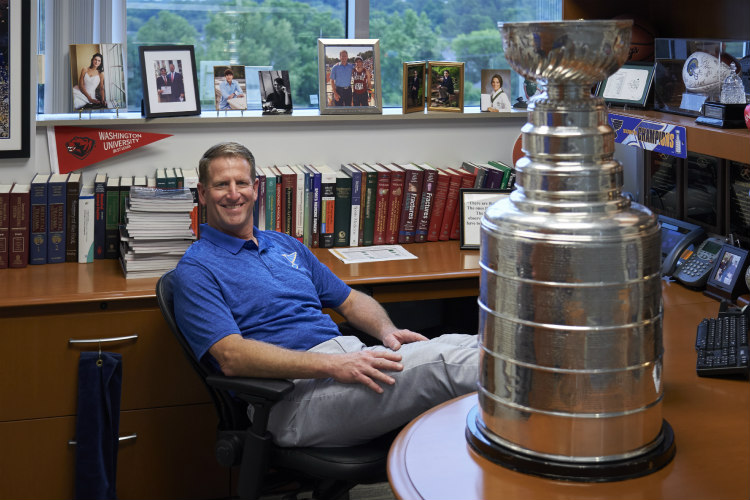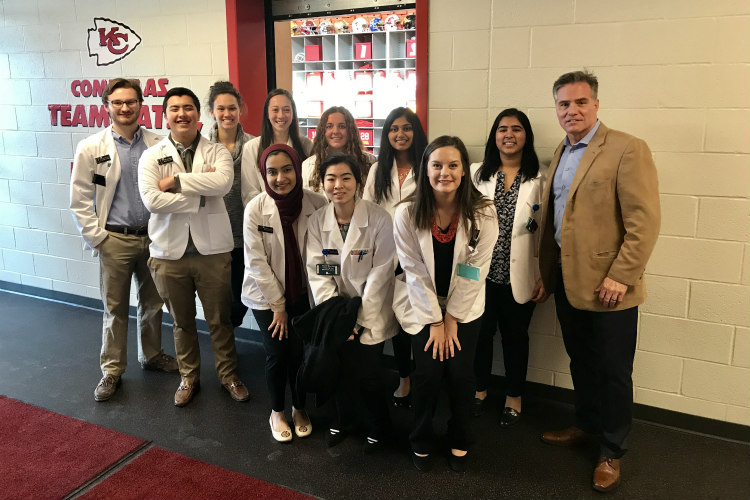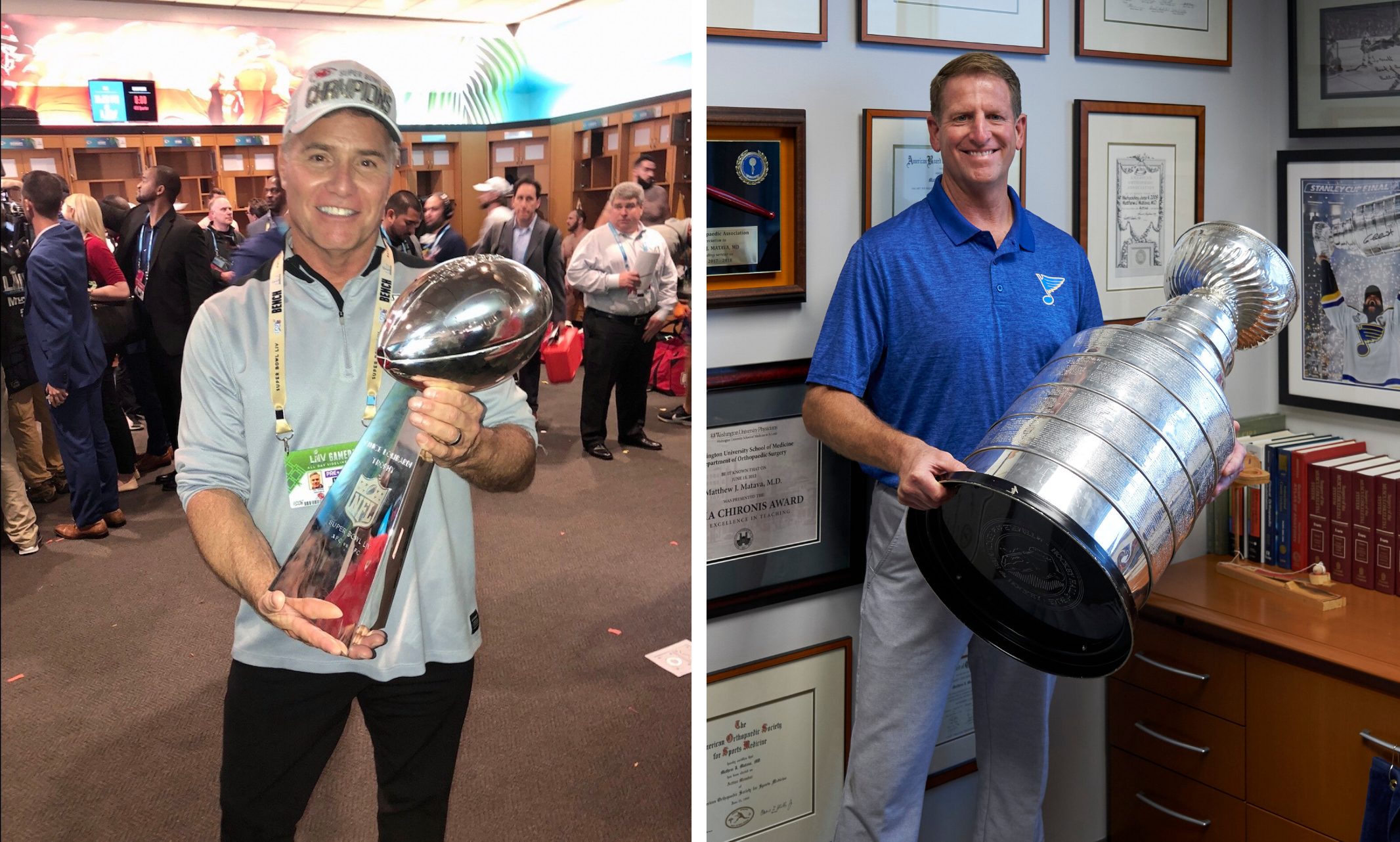What a difference a few months can make.
In February, team physician Michael Monaco (B.A. ’84, M.D. ’87) was holding the Kansas City Chiefs’ Super Bowl trophy. Now, he has a new granddaughter he hasn’t held yet, to keep her from any possible coronavirus exposure.
And last June, orthopedic surgeon Matt Matava (B.A. ’86, M.D. ’87) was tending to the St. Louis Blues as they won their first-ever National Hockey League championship. Now, he’s slowly reviving his regular surgery practice and wondering whether the rest of the hockey season will be canceled.
Both savor the camaraderie and association with elite athletes that make being a team physician special, and the particular joy of being part of a championship. But they also confront the challenges and uncertainties, personal and professional, that the pandemic has put front and center for everyone.
The peak
They didn’t complete the big touchdown pass or make the winning slap shot, but Monaco and Matava did their part to make their teams champions in the past year.
In February, Monaco was the senior physician on the sidelines with the Kansas City Chiefs when they won the team’s second NFL championship, 50 years after their first.
“I have been with the team 26 years,” Monaco said. “When I realized we were going to win the Super Bowl, I got a little teary-eyed.”
It was much the same feeling for Matava the previous June, when the Blues took the Stanley Cup.
“In 23 years with the Blues, my most memorable experience was being in Boston for Game 7 of the Stanley Cup Finals,” Matava said. “I got to hold the Stanley Cup overhead on the ice and drink champagne out of the cup in the locker room during the player celebration.”
Getting to the top, though, took years of effort, starting at the School of Medicine.

The long climb
Matava played basketball for UMKC while he was in medical school, and he wanted to be a surgeon. That focus turned to orthopedic surgery for athletic injuries when a torn ACL (a knee ligament) knocked him off the basketball court. He experienced first-hand the important process of recovering from a serious injury.
“Though I wasn’t drawn to internal medicine, my docent was Marjorie Sirridge, an excellent internist,” Matava said. “She taught us the importance of being thorough in the evaluation of patients … of sitting down when speaking with patients to let them know that you are taking time specifically for them. Doctors in general and surgeons in particular have a reputation for paying more attention to lab tests and imaging studies than to the patient themselves. No one should underestimate the importance of the physical exam.”
When he returned to his native St. Louis after a sports medicine fellowship in Cincinnati, it didn’t take long to find work with sports teams to go along with a private practice. He became a team physician for Washington University, a job he still holds along with being a professor of orthopedic surgery. He also worked for the St. Louis Rams for 16 years, until the franchise moved back to Los Angeles. That’s in addition to serving the Blues, a position he’s held since 1997.
The clock is always running
But for all the excitement of being part of sports, being a team physician also means hard work, long hours and performing under intense pressure.
“Hockey season involves up to three games a week from October to April for the regular season and into June for a deep run in the playoffs,” Matava said. “When I finish my regular clinical duties, I head to the games.” Add in his 25 years serving Washington University’s sports teams — along with football games each fall weekend during the years he was with the Rams — and Matava has spent a lot of time in locker rooms and away from his family.
“In 23 years with the Blues, my most memorable experience was being in Boston for Game 7 of the Stanley Cup Finals."
“But the most challenging aspect of being a team physician or surgeon,” Matava said, “is having to ‘bat 1,000’ in the care of every player, considering the scrutiny of the public, media, team administration, agents and other team members.”
In Monaco’s situation, being the Chiefs’ head medical team physician is a year-round job. “From the end of July when training camp begins until the exit exams after our last game, two days after the Super Bowl this past season, there are daily issues: medication changes, illness evaluations, exams for new players acquired.” He’s also involved in the preparation for the NFL Combine each February, a weeklong showcase for possible pros coming out of the colleges, and the NFL draft in April.
“I also have a full-time internal medicine concierge practice with my partner of more than 20 years,” Monaco said. “He’s been very supportive, which makes doing both possible.”
Monaco with internal medicine and Matava with orthopedic surgery exemplify the two main types of medicine for sports teams. And they both will tell you it’s about a lot more than operations to mend broken bones or reconstruct damaged joints.
According to Monaco, his medical team handles various types of injuries, such as chest and abdominal problems. In a given week, they might take care of more players than the surgical and rehab staff, keeping players hydrated and managing their electrolytes if there’s a bug going around. Quickly isolating a player with the flu, for instance, can protect the rest of the team.
“I have been with the team 26 years, when I realized we were going to win the Super Bowl, I got a little teary-eyed.”
Working and waiting
When the NHL season was suspended, Matava noted, “the team was in first place and expecting the return of Vladimir Tarasenko, our star goal scorer, whose shoulder I fixed earlier in the year.”
Now, he said, he can see the players if they are injured or require rehabilitation, but the training facility, practice rink and weight room have been off-limits across the league. Whether the season resumes or is canceled remains up in the air.
For several weeks at his other practices, Matava said, “Washington University and Barnes Hospital were on a strict lock-down with all non-emergency surgeries and procedures cancelled to treat COVID-19 patients. The most COVID patients we have had at our hospital was 95. We are now allowed to return to 50 percent of our normal duties.”

For Monaco, coping with the pandemic has meant focusing on safety for his staff and patients, and for Menorah Medical Center in Overland Park, Kansas, where he is on the Medical Executive Committee. Precautions have worked to reduce the pandemic’s effects, but they can’t be eliminated.
“After my first positive COVID-19 in the office, I have been doing all testings outside in the parking lot using personal protective equipment,” he said. “I am doing this to protect my staff, others in the office and all those who come into our medical building.”
One picture in particular, of a tent attached to the hospital, haunts Monaco: “Family members of COVID-19 patients cannot be allowed in the hospital, but we placed a tent next to the window of one dying patient in the intensive care unit to allow the family to be with and grieve for their loved one.”
Personally, Monaco said, precautions have meant he has yet to hold his third granddaughter, born just a few days before the pandemic was declared. And his son, Nicholas Monaco, a 2017 graduate of the six-year medical program at UMKC, is serving his internal medicine residency in Georgia, where the incidence of coronavirus cases is high.
“I would say this virus has had a definite impact on my life professionally and personally, like so many other health care workers,” Monaco said.
Monaco also is in touch with other Chiefs physicians, and infectious disease specialists across the country, as the team moves toward possibly reopening some facilities. Resuming sports would provide a great emotional outlet for fans, he said, but there’s no telling when that might be possible safely.
“Unfortunately, I do not see it going away soon,” he said. “I can only hope we come up with more and improved testing to give us the data that we need to make better decisions, better treatment protocols to reduce the morbidity and mortality associated with this virus, and eventually a vaccine to once and for all give the global community enough herd immunity so we can get back to work and life again.”

